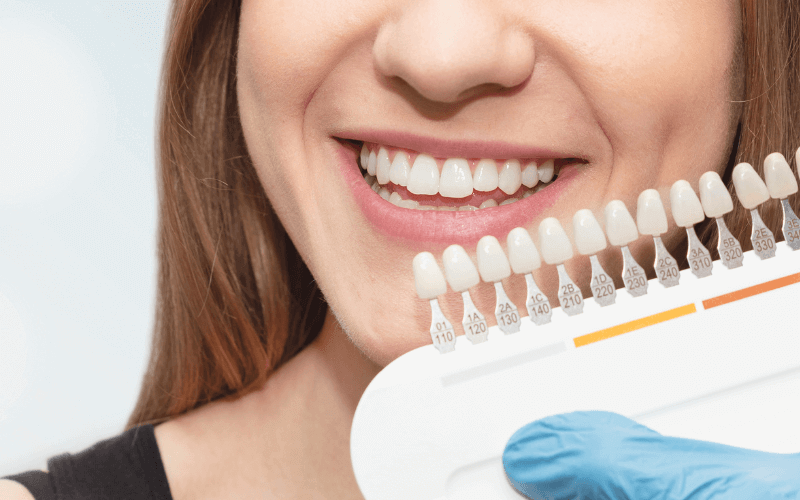When it comes to enhancing your smile and restoring dental functionality, two popular options often come into consideration: veneers and crowns. Both are effective solutions, but determining which one is best for you can depend on various factors including the condition of your teeth, your aesthetic goals, and your budget. Veneers are typically favoured for cosmetic improvements, while crowns offer more extensive structural support. In this blog, we will delve into the key differences between veneers and crowns, helping you make a more informed decision for your dental health.
In this blog:
- Brief Summary: Crowns vs Veneers
- What are Veneers?
- What are Crowns?
- Veneers vs Crowns: Key Differences
- Which is Right for You?
- Consultation with a Dentist
- Crowns and Veneers at Dental Aspects
Brief Summary: Crowns vs Veneers
| Aspect | Veneers | Crowns |
|---|---|---|
| Purpose | Cosmetic enhancement | Cosmetic and structural restoration |
| Materials Used | Porcelain, composite resin | Porcelain, zirconia, metal, porcelain-fused-to-metal, composite resin |
| Application Process | Preparation, impression, bonding | Tooth preparation, impression, fitting, bonding |
| Benefits | Aesthetic improvement, stain resistance, durability | Structural support, durability, restoration of function and appearance, protection |
| Disadvantages | Irreversible, no structural support | Invasive, cost, longer recovery time, potential wear and damage |
| Cost | Less expensive (composite resin), more costly (porcelain) | Varies by material; more expensive (porcelain, zirconia) |
| Durability | 10-15 years | Many years |
| Treatment Timelines | 2-3 visits | 2 visits (may include temporary crown) |
What are Veneers?
Definition and Purpose
Veneers are thin, custom-made shells designed to cover the front surface of teeth, improving their appearance. They’re primarily used for cosmetic purposes, addressing issues like discolouration, minor misalignments, chips, and gaps. Veneers offer a transformative solution for those seeking a perfect smile.
Materials Used
Veneers are typically crafted from porcelain or composite resin:
-
- Porcelain Veneers: These are more stain-resistant and mimic the light-reflecting properties of natural teeth. They’re known for their durability and natural look.
-
- Composite Resin Veneers: These are a less expensive alternative to porcelain veneers. While they can be applied in a single visit, they may not last as long and can be more prone to staining.
Application Process
-
- Consultation: The process begins with a consultation where your dentist will evaluate your teeth and discuss your goals.
- Preparation: A small amount of enamel is removed from the front of the tooth to accommodate the veneer. This ensures a natural fit and appearance.
- Impression: An impression or digital scan of your teeth is taken to create a model. This model is used to craft the custom veneers.
- Temporary Veneers: Temporary veneers may be placed while the permanent ones are being made.
- Bonding: Once the permanent veneers are ready, they are checked for fit and colour. The teeth are then cleaned, polished, and etched to ensure a strong bond. A special adhesive is applied, and the veneer is placed on the tooth. A curing light is used to harden the adhesive.
Benefits
-
- Aesthetic Improvement: Veneers provide a natural and aesthetically pleasing appearance, significantly enhancing the smile.
-
- Stain Resistance: Porcelain veneers are highly resistant to stains from coffee, tea, and other staining agents.
-
- Durability: With proper care, veneers can last 10-15 years, making them a long-term solution for many cosmetic dental issues.
-
- Minimally Invasive: Compared to crowns, veneers require less removal of the natural tooth structure.
Suggested Reading: The Benefits Of Veneers For Smile Enhancement
Disadvantages
-
- Irreversibility: The process of applying veneers is irreversible because it involves the removal of some enamel from your teeth.
-
- Cost: Veneers can be expensive, especially porcelain veneers, which require custom manufacturing.
-
- No Structural Support: Veneers are primarily cosmetic and do not provide significant structural support to weakened or damaged teeth.
-
- Sensitivity: Some patients may experience increased tooth sensitivity after the enamel is removed and veneers are applied.
Veneers are an excellent option for those looking to enhance the aesthetics of their smile with minimal impact on their natural teeth. However, they may not be suitable for individuals with significant tooth damage or decay, where structural support is also required.
Suggested Reading: What Are The Pros And Cons Of Veneers?
What are Crowns?
Crowns, also known as dental caps, are custom-made covers designed to encase the entire tooth, restoring its shape, size, strength, and appearance. They are used when a tooth is significantly damaged, decayed, or after a root canal treatment. Crowns help in restoring the functionality and aesthetics of a tooth while providing protection against further damage.
Materials Used
Crowns can be made from various materials, each with its own advantages:
-
- Porcelain: Porcelain crowns are popular for their natural appearance and ability to blend seamlessly with the surrounding teeth. They are especially preferred for front teeth restorations.
-
- Zirconia: Zirconia crowns are known for their strength and durability. They are highly resistant to wear and are often used for molars and premolars.
-
- Metal: Metal crowns, including those made from gold or other alloys, are very durable and can withstand strong biting and chewing forces. However, their metallic colour makes them less popular for visible teeth.
-
- Porcelain-fused-to-metal (PFM): These crowns combine the strength of metal with the aesthetic appeal of porcelain. They provide a good balance of durability and appearance.
-
- Composite Resin: Composite resin crowns are less expensive but not as durable as other types. They are prone to wear and staining over time.
Application Process
-
- Consultation and Examination: The dentist evaluates the tooth to determine if a crown is the best solution and discusses the available materials.
- Tooth Preparation: The tooth is reshaped to make room for the crown. This involves removing a portion of the tooth structure to ensure the crown fits properly.
- Impression: An impression or digital scan of the prepared tooth is taken to create a precise model for the crown.
- Temporary Crown: A temporary crown is placed to protect the prepared tooth while the permanent crown is being fabricated.
- Fitting and Bonding: Once the permanent crown is ready, the temporary crown is removed. The new crown is checked for fit and colour before being permanently bonded to the tooth using dental cement.
Benefits
-
- Structural Support: Crowns provide excellent structural support, restoring the strength and function of damaged teeth.
-
- Durability: Depending on the material, crowns can last many years, providing a long-term solution for tooth restoration.
-
- Restoration of Function and Appearance: Crowns restore the tooth’s ability to bite and chew properly, and modern materials can match the natural appearance of teeth.
-
- Protection: Crowns protect the tooth from further decay and damage by encasing it completely.
Disadvantages
-
- Invasive Procedure: The preparation process for crowns is more invasive than veneers, requiring significant reshaping of the natural tooth.
-
- Cost: Crowns can be expensive, especially those made from high-quality materials like porcelain or gold.
-
- Longer Recovery Time: After the procedure, some patients may experience sensitivity and discomfort as the tooth and surrounding gums heal.
-
- Potential for Wear and Damage: While crowns are durable, they can still be subject to wear and damage over time, especially with poor oral hygiene or excessive biting forces.
Crowns are a versatile and robust solution for restoring severely damaged or decayed teeth. They not only enhance the appearance of the teeth but also restore functionality, making them a comprehensive option for dental restoration. However, the choice of material and the extent of the procedure should be carefully considered in consultation with your dentist.
Veneers vs Crowns: Key Differences

Cosmetic vs Structural Use
-
- Veneers: Primarily used for cosmetic enhancements. They are ideal for correcting minor imperfections such as chips, cracks, discolouration, and slight misalignments. Veneers are a great option for individuals looking to improve the appearance of their smile without significant structural damage to their teeth.
-
- Crowns: Used for both cosmetic and structural purposes. Crowns cover the entire tooth, providing strength and protection to teeth that are significantly damaged, decayed, or have undergone root canal treatment. They restore functionality while also improving appearance.
Material and Durability Comparison
-
- Veneers: Typically made from porcelain or composite resin. Porcelain veneers are more durable and resistant to staining but can be more expensive. Composite resin veneers are less costly but may not last as long and are more prone to staining.
-
- Crowns: Made from a variety of materials, including porcelain, zirconia, metal, porcelain-fused-to-metal, and composite resin. Each material has its pros and cons in terms of strength, durability, and appearance. Metal crowns are the most durable, while porcelain and zirconia offer a natural look with good strength.
Cost Comparison
-
- Veneers: Generally less expensive than crowns, especially composite resin veneers. However, porcelain veneers, which are more durable and aesthetically pleasing, can be more costly.
-
- Crowns: The cost of crowns can vary significantly based on the material used. Metal crowns tend to be less expensive, while porcelain and zirconia crowns are on the higher end of the cost spectrum due to their natural appearance and durability.
Suggested Reading: Dental Crown Cost In Australia
Treatment Timelines
-
- Veneers: The process of getting veneers typically requires two to three visits. The first visit involves consultation and preparation, the second for impressions, and the final visit for bonding the veneers.
-
- Crowns: The process for crowns can often require two visits. The first visit includes tooth preparation and impressions, followed by a second visit for fitting and bonding the permanent crown. In some cases, temporary crowns are used while the permanent crown is being fabricated.
Understanding the key differences between veneers and crowns helps in making an informed decision. Veneers are suitable for those primarily looking for cosmetic improvements, while crowns are ideal for individuals needing structural reinforcement and protection for their teeth. The choice between the two depends on the specific dental issues, aesthetic goals, and budget considerations.
Suggested Reading: The Full Guide To Getting Veneers: Everything You Need To Know
Which is Right for You?

Factors to Consider Before Deciding Between Veneers or Crowns
-
- Extent of Damage or Decay
Veneers: Suitable for minor cosmetic issues like discolouration, chips, and small gaps.
Crowns: Ideal for more extensive damage or decay, providing structural support and protection.
-
- Cosmetic Goals
Veneers: Perfect for those looking to enhance the appearance of their smile with a minimally invasive procedure.
Crowns: Better suited for restoring both function and aesthetics in cases where the tooth is significantly compromised.
-
- Budget
Veneers: Generally less expensive, particularly composite resin veneers. Porcelain veneers can be more costly but offer better aesthetics and durability.
Crowns: Can be more expensive, especially porcelain and zirconia crowns. Metal crowns are a less costly option but are less aesthetically pleasing.
-
- Longevity and Durability
Veneers: Porcelain veneers are durable and can last 10-15 years with proper care, but they don’t offer structural support.
Crowns: Provide excellent durability and can last many years, especially when made from strong materials like zirconia or metal. They also offer structural reinforcement.
-
- Oral Health and Hygiene
Veneers: Require good oral hygiene practices to maintain their appearance and longevity. They do not protect against decay and underlying tooth issues.
Crowns: Offer protection against further decay and damage, making them suitable for teeth that have undergone significant restorative work or root canal treatment.
Consultation with a Dentist
The best way to determine whether veneers or crowns are right for you is to consult with a qualified dentist. They will assess the condition of your teeth, discuss your cosmetic and functional goals, and recommend the most suitable option based on your individual needs.
Crowns and Veneers at Dental Aspects
At Dental Aspects, we understand the importance of a healthy and beautiful smile. Our experienced team is dedicated to providing top-quality dental restorations, including crowns and veneers, tailored to meet your unique needs. Whether you’re looking to enhance the aesthetics of your smile or restore the function and strength of damaged teeth, we offer comprehensive solutions to help you achieve your dental goals.
Customised Veneers
Our veneers are designed to transform your smile with minimal impact on your natural teeth. We offer both porcelain and composite resin veneers, ensuring you have options that fit your budget and aesthetic preferences. Here’s what you can expect when choosing veneers at Dental Aspects:
-
- Personalised Consultation: We start with a thorough consultation to understand your goals and evaluate your oral health. This helps us recommend the best type of veneers for your needs.
-
- Precise Fabrication: We create custom veneers that fit perfectly and blend seamlessly with your natural teeth. Our porcelain veneers are crafted to mimic the translucency and colour of your teeth, providing a natural and beautiful appearance.
-
- Expert Application: Our skilled dentists meticulously prepare your teeth and bond the veneers, ensuring a comfortable fit and long-lasting results. The entire process is designed to be as smooth and pain-free as possible.
Durable Crown
For teeth that require more than just a cosmetic touch-up, our crowns offer the perfect solution. We provide a range of crown materials, including porcelain, zirconia, and metal, to suit different needs and preferences. Here’s what you can expect when choosing crowns at Dental Aspects:
-
- Comprehensive Assessment: We conduct a detailed examination to determine the best course of action for restoring your teeth. This includes evaluating the extent of damage and discussing your treatment options.
-
- High-Quality Materials: Our crowns are made from the highest quality materials to ensure durability and a natural look. Whether you need a crown for a front tooth or a molar, we have options that combine strength and aesthetics.
-
- Seamless Integration: Our dentists are experts in preparing teeth for crowns and ensuring a precise fit. We take impressions or digital scans to create crowns that fit perfectly and restore the function and appearance of your teeth.
Why Choose Dental Aspects?
-
- Expertise and Experience: Our team of highly trained dentists has extensive experience in cosmetic and restorative dentistry. We stay updated with the latest advancements to provide you with the best care.
-
- Patient-Centered Care: At Dental Aspects, your comfort and satisfaction are our top priorities. We take the time to understand your needs and ensure you’re fully informed about your treatment options.
-
- State-of-the-Art Technology: We use advanced dental technology to enhance the precision and effectiveness of our treatments. This includes digital imaging, 3D modelling, and high-quality materials.
-
- Comprehensive Dental Services: Beyond crowns and veneers, we offer a wide range of dental services to address all your oral health needs. From emergency dentistry, children’s dentistry, root canal treatments, dentures and teeth whitening, we’ve got you covered.
If you’re considering veneers or crowns, we invite you to schedule an appointment in our Browns Plains Dental Clinic. Let us help you achieve a healthy, beautiful smile that you can be proud of. Contact Dental Aspects today to learn more about our services and book your appointment.



